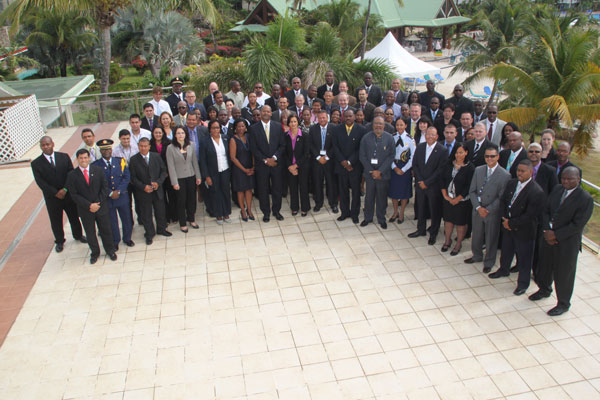 Maho:--- Several dignitaries and Ministers from the Council of Ministers took time out on Tuesday morning to address the visiting members of Interpol that are currently participating in a three day seminar on the island. Prime Minister Sarah Wescot Williams, Minister of Justice Roland Duncan, Minister of Health Cornelius de Weever and Chairlady of Parliament Gracita Arrindell applauded Interpol for choosing St. Maarten to host their Awareness Seminar and Workshop during the opening ceremony.
Maho:--- Several dignitaries and Ministers from the Council of Ministers took time out on Tuesday morning to address the visiting members of Interpol that are currently participating in a three day seminar on the island. Prime Minister Sarah Wescot Williams, Minister of Justice Roland Duncan, Minister of Health Cornelius de Weever and Chairlady of Parliament Gracita Arrindell applauded Interpol for choosing St. Maarten to host their Awareness Seminar and Workshop during the opening ceremony.Chief Commissioner of Police Peter de Witte considered it an honor for St. Maarten to host the first congress soon after the island became a member of Interpol. De Witte said the congress is an important asset for crime fighting internationally. The top cop said that the police organization normally places their focus on security, the fight against drugs, violence, and weapons. However, since the advancement of medical science Interpol is better equipped to monitor pharmaceutical crimes.
He said right now focus has to be placed on a simple pain killer for the flu, complicated cancer medications, and the treatment of HIV/AIDS. De Witte said anything that attracts financial investments casts its own shadow and attracts unscrupulous people who want to make a huge profit, something which is now prevalent in health care. "The topic chosen by Interpol for this seminar may not be the most exciting topic for international crime fighting but one must realize that the topic surrounds the most precious thing, which is health and human life," De Witte said.
Rosinete de Santana Barbosa, assistant director of NCB told the gathering that criminals do not know their boundaries in their dark activities and as such they have not left the international police community with any choice but to work together in order for them to combat common threats. Therefore, Interpol has numerous tools and services available to its members to facilitate international law enforcement agencies around the world. Barbosa said one of the main reasons for hosting the seminar on St. Maarten is for Interpol to share its tools and services and to provide support for national and regional policing. She said Interpol has heeded the call of the Caribbean nations to further protect their people from counterfeit medicine. Barbosa said Interpol will support all its members to the fullest to combat what has now become prevalent in the Caribbean.
She said Interpol is able to provide 24 hour response while connecting their members through a special system which would give police real time access to information and their criminal data base. Their forensic experts are also able to provide their members with support regarding fingerprints, DNA analysis, and disaster victim identification.
During the three day seminar, Interpol officials will share their concerns on the serious health issues that counterfeit medical products pose to citizens. She described the distribution of counterfeit medicine as a cruel form of crime which undermines corporate innovations, creativity, and intellectual property and targets vulnerable and innocent persons. The high profit in counterfeit medicine and the slim risk of catching the perpetrators has attracted the organized criminals. She said currently medical products are facing a huge challenge by counterfeit medicine. Certain criminal organizations are able to replicate drugs making it almost impossible to distinguish the real products from the counterfeit.
Barbosa said besides the ideal packaging and embedded security features used by the criminals, law enforcement is facing challenges by not having the right legislation, corruption, and lack of sufficient law enforcement agencies to tackle the problem.
Therefore, Interpol has developed a multi-sectorial approach by building a global network for their partners ranging from law enforcement health and regulatory authorities such as customs in order to carry out their activities aimed at dismantling the organized criminal groups that are involved in the counterfeiting.
Interpol has an agreement with the World Health Organization and they have joined the WHO's Medical Products and Anti-Counterfeiting Taskforce known as IMPACT. So far, Interpol has been able to shut down 13,000 websites that were trafficking counterfeit pharmaceutical products. They also managed to confiscate 2.4 million individual doses of potentially harmful drugs including antibiotics, anti cancer, anti epileptic pills, steroids, and food supplements from the black market which has a price tag of 6.3 million United States Dollars. Thus far, fifty five persons have been arrested in 15 countries around the world.












